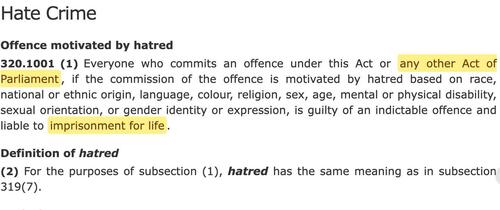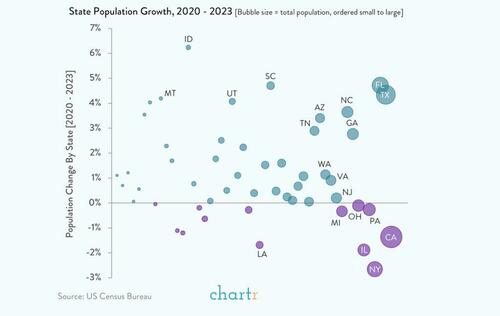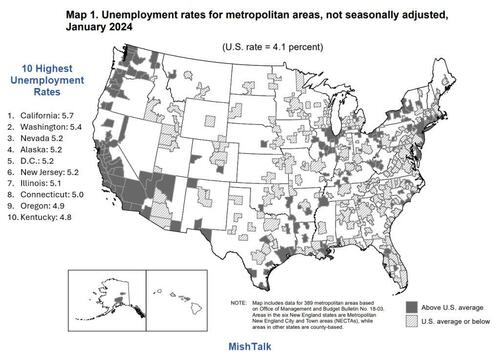In the name of tolerance, tolerance is being abolished; this is a real threat we face.
Feed aggregator
CFTC Aims To Ban Derivatives Based On Elections, Athletic Competitions And Awards Contests
CFTC Aims To Ban Derivatives Based On Elections, Athletic Competitions And Awards Contests
Tyler Durden
Sun, 05/12/2024 - 23:00
Previously enjoyed betting on the outcome of an event, like a Presidential election? The CFTC wants to make sure that doesn't happen again.
According to the Wall Street Journal, the regulator is now targeting "derivatives contracts based on political elections, athletic competitions and awards contests" to try and draw more prominent lines between investing and gambling.
The Commodity Futures Trading Commission proposed a regulation to oversee event contracts, a rapidly growing market where investors bet on event outcomes, the report said.
The proposed regulation won’t affect sports betting through traditional sportsbooks regulated by state commissions or popular online platforms like DraftKings. Nor will it impact offshore platforms like Betfair, which currently allows U.S. election bets.
The proposal, approved 3-2 along party lines, will undergo public review before a final vote in the coming months. Democratic commissioners emphasized the potential threat to election integrity posed by political event contracts, particularly with a Biden-Trump rematch looming.
Christy Goldsmith Romero, a Democratic commissioner, said: “Never before has the sanctity of elections been so critical or so under threat. The CFTC should not allow products in our markets with an unacceptable risk of unchecked abuse and manipulation that could threaten the sanctity of elections, thereby threatening democracy and national security.”
Yet the proposal was called “grossly overbroad” by Summer Mersinger, a Republican commissioner, the report noted.
One company that offers "yes" or "no" betting questions has been Kalshi. Event contracts, though small compared to stocks or futures, have grown rapidly since Kalshi launched in 2021. Recent Kalshi contracts included wagers on whether "Oppenheimer" would win Best Picture and if Columbia University's president would be ousted.
CFTC Chair Rostin Behnam, a Democrat supporting the proposal, noted that more event contracts were listed in 2021 than in the previous 15 years combined.
The CFTC has previously blocked U.S. trading platforms from launching political betting markets. Last year, it prevented Kalshi from offering contracts based on which party controls Congress, prompting Kalshi to sue the agency in November over the rejection.
“We look forward to continuing to engage with our regulators and Congress, as we have always done, to ensure that our customers can participate in legitimate trading with legitimate use cases on a legitimate, regulated exchange and not on offshore and illegal markets where there is no customer protection or market integrity,” Mansour told WSJ.
CFTC regulations established after the 2010 Dodd-Frank Act prohibit event contracts involving terrorism, assassination, war, gaming, or illegal activities, but the lack of a clear definition of “gaming” led to disputes over whether it applies to sports and political contracts, prompting Friday's proposal to explicitly ban wagers on elections, sports, or awards contests.
The New York Times Denounces Cancel Culture... After Fueling Cancel Culture For Years
The New York Times Denounces Cancel Culture... After Fueling Cancel Culture For Years
Tyler Durden
Sun, 05/12/2024 - 22:30
For those of us who have criticized the cancel culture in higher education for years, the attacks and shunning have been unrelenting. The media has played a role in that culture and none more prominently than the New York Times. Recently, however, the mob came for liberal professors and media who have remained silent for years as conservatives and others were targeted on campus.
Suddenly, there is a new interest in free speech and academic freedom, including by the Times editors who blamed cancel culture for the recent demonstrations and disruptions on campus.
Until good liberals were targeted on campus, cancel culture was treated as free speech. It did not matter that preventing others from speaking or being heard is the very antithesis of free speech.
The New York Times reached true infamy in the controversy over publishing Sen. Tom Cotton’s (R., Ark.) op-ed where he argued for the possible use of national guard to quell violent riots around the White House.
It was one of the lowest points in the history of modern American journalism. Cotton was calling for the use of the troops to restore order in Washington after days of rioting around the White House. While Congress would “call in the troops” six months later to quell the rioting at the Capitol on January 6th, New York Times reporters and columnists called the column historically inaccurate and politically inciteful.
Reporters insisted that Cotton was even endangering them by suggesting the use of troops and insisted that the newspaper cannot feature people who advocate political violence. One year later, the New York Times published a column by an academic who had previously declared that there is nothing wrong with murdering conservatives and Republicans.
Later, former editors came forward to denounce the cancel culture at the Times and the censorship of opposing views.
At the same time, the Times has embraced “advocacy journalism.” Former New York Times writer (and now Howard University Journalism Professor) Nikole Hannah-Jones is a leading voice for advocacy journalism. Indeed, Hannah-Jones has declared “all journalism is activism.”
Now, however, liberal professors and writers are being targeted. After years of turning a blind eye to conservative and libertarian figures being purged from faculties or canceled in events, the Times is alarmed that
…students and other demonstrators disrupting college campuses this spring are being taught the wrong lesson — for as admirable as it can be to stand up for your beliefs, there are no guarantees that doing so will be without consequence.
What is most striking is how the editors chastise administrators for lacking the courage that they have not shown for years in standing up to their cultural warriors:
For several years, many university leaders have failed to act as their students and faculty have shown ever greater readiness to block an expanding range of views that they deem wrong or beyond the pale. Some scholars report that this has had a chilling effect on their work, making them less willing to participate in the academy or in the wider world of public discourse. The price of pushing boundaries, particularly with more conservative ideas, has become higher and higher…
It has not gone unnoticed — on campuses but also by members of Congress and by the public writ large — that many of those who are now demanding the right to protest have previously sought to curtail the speech of those whom they declared hateful.
It is certainly good to see the “Old Gray Lady” have second thoughts about cancel culture. However, she might want to look inwardly before casting more cultural stones.
Coffee Is Anti-Aging, Linked To Prevention Of Dementia And Sarcopenia: Study
Coffee Is Anti-Aging, Linked To Prevention Of Dementia And Sarcopenia: Study
 (portumen/Shutterstock)
Tyler Durden
Sun, 05/12/2024 - 21:30
(portumen/Shutterstock)
Tyler Durden
Sun, 05/12/2024 - 21:30
Authored by Ellen Wan via The Epoch Times (emphasis ours),
Enjoying a cup of joe can offer more than just a pick-me-up: It has been shown to have numerous health benefits, especially for older people. Research has found that the natural molecule in coffee, trigonelline, can help improve sarcopenia (age-related muscle loss) and maintain muscle function during aging.
 (portumen/Shutterstock)
(portumen/Shutterstock)
Muscle mass and function gradually decline as we age, potentially leading to sarcopenia. This can hinder mobility and even result in dependence and disability. The hallmarks of sarcopenia include a decline in nicotinamide adenine dinucleotide (NAD+) levels and mitochondrial dysfunction.
Recent Research
A study published in Nature Metabolism in March found that trigonelline is a precursor to NAD+. Increasing the therapeutic dose of trigonelline can raise the levels of NAD+ in the cells of sarcopenia patients. Supplementing trigonelline also enhanced mitochondrial activity, NAD+ levels, and muscle function in aged mice. Furthermore, long-term supplementation of trigonelline significantly increased grip strength in the forelimbs of aged mice.
However, the study also pointed out that sarcopenia is a multifactorial disease, and trigonelline cannot reverse all its causes. It must be combined with other nutrients that help maintain muscle, such as protein, vitamin D, or omega-3 fatty acids.
Nutrition and physical activity are important for older people to maintain healthy muscles. Assistant professor Vincenzo Sorrentino from the Health Longevity Translational Research Program at the National University of Singapore Yong Loo Lin School of Medicine, who participated in the study, stated in a press release that this research on trigonelline has increased the potential for achieving healthy longevity and addressing age-related diseases.
Trigonelline is found in plant-based foods such as coffee beans and fenugreek seeds.
A study involving 1,781 older Korean men indicated that coffee consumption was associated with a reduced risk of sarcopenia. Compared to those who drank less than one cup of coffee per day, individuals who drank at least three cups of coffee per day had a significantly lower probability of developing sarcopenia. However, the risk reduction was less pronounced among those who consumed one or two cups of coffee daily.
Understanding the Benefits and Drawbacks of Coffee Consumption
Many people drink coffee without considering its health benefits or risks. However, debates about coffee have been ongoing for a long time.
Coffee is a complex mixture containing approximately 1,000 chemicals. Human reactions to coffee or caffeine vary, and the effects can vary significantly depending on the amount consumed.
One study found that drinking three to five cups of coffee per day in midlife was associated with a 65 percent lower risk of developing dementia or Alzheimer’s disease in old age. Another study found that compared to light coffee drinkers (one to two cups per day), heavy coffee drinkers (more than six cups per day), non-coffee drinkers, and those who drank decaffeinated coffee had higher odds of developing dementia.
A study published in The New England Journal of Medicine in 2020 showed that consuming three to five cups of coffee daily was associated with a reduced risk of several chronic diseases. However, considering that excessive caffeine intake may have some adverse effects, it is recommended that adults who are not pregnant or breastfeeding limit their daily caffeine intake to 400 milligrams, while pregnant and breastfeeding women should limit their daily caffeine intake to 200 milligrams. Additionally, research has found that very high caffeine intake (more than 1,000 milligrams per week) is a risk factor for anxiety and depression.
Due to the differences in coffee bean varieties and extraction methods, the caffeine content can vary significantly. Therefore, when consuming coffee daily, checking the actual caffeine content listed on the product packaging is recommended.
It is also important to note that many commercially available coffees are often mixed with heavy cream and flavored syrups, which can add extra calories, sugar, and saturated fat, diminishing the health benefits of black coffee.
Iced Pumpkin Spice Latte
Johns Hopkins Medicine shared an easy-to-make and healthy coffee recipe on its website:
Ingredients:
- 1 cup brewed coffee
- ½ cup canned plain pumpkin
- ½ cup milk
- 2 teaspoons pumpkin pie spice (or ½ teaspoon each of cinnamon, ginger, nutmeg, and allspice)
- 1 teaspoon vanilla extract
- 4 ice cubes
Preparation: Blend all ingredients for a seasonally-inspired beverage. Adding pumpkin helps increase fiber intake, which is beneficial for gut health.
Note: It is advisable to use as little sugar as possible. If you must add a sweetener, consider using a small amount of pure maple syrup.
Seattle Could Shutter 20 Elementary Schools Due To Budget Constraints
Seattle Could Shutter 20 Elementary Schools Due To Budget Constraints
Tyler Durden
Sun, 05/12/2024 - 21:00
When happens when your city pisses away all of your tax revenue on trying to feed, shelter and coddle activists and homeless people? You wind up having to make budget cuts. And, in Seattle, those cuts could be coming in the form of closing up to 20 elementary schools.
The district’s budget deficit has reached more than $100 million, according to new reporting from MYNorthwest.
And Superintendent Brent Jones' proposal for 'Well-Resourced Schools' might lead to the shutdown of over a quarter of the district's 73 elementary schools, the report says.
According to the Seattle Public Schools, 29 of these schools have fewer than 300 students each, and are considered under-enrolled. The district warns that keeping these schools open may necessitate cuts or the elimination of preschool programs, a reduction in core staff, larger class sizes, and fewer curriculum offerings.
The plan has been met with considerable opposition from both parents and teachers, who expressed their concerns at Wednesday's meeting.
Ben Gitenstein, a parent of a student in the SPS district commented: “It’s not 20 schools, it’s 20 communities. All the kids who thought they knew who their next year’s teacher would be. All the local mom-and-pop stores that sell ice cream to the kids after school, they’re all going to be seriously impacted."
He continued: “Closing neighborhood schools is really bad for neighborhoods and it’s really bad for all of us because, at the end of the day, the real problem here is enrollment."
Superintendent Brent Jones commented: “We’re trying to make sure we’re focused on the students’ experience and not just a building.”
The report concluded stating that, at the meeting, Jones reflected on his own experiences as a student within SPS, noting that he attended four different elementary schools. He described each transition as a positive experience.
School closures, under his plan, would not take place until the 2025-2026 school year at the earliest. He is scheduled to present an initial recommendation at a school board meeting on June 10.
Good luck with that.
What Is Self-Determination?
People go on quite a bit about self-determination these days. Some decry the denial of self-determination to “the Palestinians.” Others insist that only “the Jewish people” can have the right to self-determination between the Jordan River and the Mediterranean Sea. Israel passed a law declaring that principle in 2018. Unfortunately, I see too little thought … Continue reading "What Is Self-Determination?"
The post What Is Self-Determination? appeared first on Antiwar.com.
Enemies of ZOG: Father Charles Coughlin

WHEN TRAITORS RULE, PATRIOTS ARE PARIAHS
If the US were not the bitch of Organized Jewry (Communism & Zionism), Charles Coughlin's crusade against its Satanism would be taught in every public school.
Hollywood would make blockbusters about him, instead of Barbie & the Communist Robert Oppenheimer.
Reb Culhane is the pseudonym of a 21 year old college student in Denver, Colorado.
from Dec 11, 2009
By Reb Culhane
Throughout the 20th century, voices that cut a little too close to the core of the New World Order, were silenced, slandered, and discredited. One such voice, was Father Charles Coughlin (1891-1979.) A Roman Catholic priest of Canadian birth, Coughlin pioneered use of the radio to reach vast numbers of people during the 1930s era of Roosevelt's New Deal. Father Coughlin spoke the truth in key areas which led to his consignment to the "wrong" side of history in official accounts.
Originally
a strong supporter of the Wall Street puppet FDR, Coughlin said, "The New Deal is Christ's
Deal" and "God is directing Franklin Roosevelt." However, he soon changed his mind. Coughlin became a staunch proponent of monetary
reform and an early advocate of abolishing the Federal Reserve.
With the advent of Coughlin's radio program, he began to reach millions of people a week and by 1934 had become the most prominent Roman Catholic economic and political speaker. Roosevelt himself sent Frank Murphy and JFK's father Joseph P. Kennedy to try and "tone him down." Coughlin ignored them and began to denounce FDR as a puppet of Wall Street. Coughlin also began to support the Louisiana populist leader Huey Long, who was murdered by the Illuminati.
Father
Coughlin was a major opponent of the twin Hegelian heads of the New
World Order, monopolistic capitalism and communism. He declared in 1935
"I have dedicated my life to fight against the heinous rottenness of
modern capitalism because it robs the laborer of this world's goods.
But blow for blow I shall strike against Communism, because it robs us
of the next world's happiness."
Indeed, Coughlin was by very nature anti-globalist and supported the America First Movement of which Charles Lindbergh was a prominent figure.
"Less care for internationalism and more concern for national prosperity" was a campaign slogan of Coughlin's organization, the National Union for Social Justice. Speaking like this brought the full scorn of the New World Order down on the outspoken Catholic priest.

SHUTDOWN
During
its height, Coughlin's radio program was wildly popular, with listeners
flooding his office with 80,000 letters a week. It is estimated that
almost a third of the nation tuned in at the time. However, Coughlin's
popularity gained him some powerful enemies. The Roman Catholic Church
itself did not approve of him and the Vatican wanted him silenced. The
Roosevelt administration was determined to shut down the "Radio Priest".
Eventually accomplished this by performing an end run around the 1st
Amendment. The administration decided that
freedom of speech did not apply to broadcasting because radio was a
"limited national resource" and should be regulated as a "publicly
owned commons." New regulations were put into place demanding that
regular radio broadcasters obtain operating permits. Coughlin was
denied a permit and forced off the air.
He attempted to work around
this by purchasing air time, but this became incredibly costly and
reduced his resources and ability to reach people. Coughlin then
resigned himself to publishing editorials in his own newspaper,
entitled Social Justice. The Roosevelt administration acted
predictably and revoked his mailing privileges, rendering him impotent
in sending the paper out to subscribers.
Upon this, his influence was crippled. In addition, the attack on Pearl Harbor and entrance into World War II turned public opinion against anti-interventionists like Coughlin and official government propaganda smeared them as "collaborating with the enemy."
Thus,
Coughlin faded into obscurity, spending his retirement keeping a low
profile and writing anti-communist pamphlets until his death in 1979.
His church, the National Shrine of the Little Flower in Royal Oak,
Michigan, still stands today and was declared a National Shrine by the
United States Bishops Conference in 1998.
Modern history texts smear him as a demagogue and anti-Semite with fascist sympathies. This isn't surprising because the winners write history and the Illuminati has been the winner for quite some time now.
CONCLUSION
Father Charles Coughlin was a strong anti-NWO activist and showed steadfast courage and bravery in his crusade to expose those who run the Shadow government. He pointed to the power structure, the central bankers, and called to abolish their control center, the Federal Reserve. For this he should be commended and held as an example for all patriots who value God, Freedom, and Country.
Coughlin's story also brings with it a strain of pessimism, though.
After all, if a man who once had the attention of a third of the nation could not effect change, what
chance do we have of doing so today?
It Takes a Swarm to Raise a Village
Millennials like me were confused and incensed during the subprime mortgage crisis of 2008. We wanted reform. We wanted heads to roll. We got corporate welfare instead. In the ensuing decade and a half, we have listened and nodded along as politicians and news outlets rail against the greed of Wall Street grifters who packaged riskier and riskier mortgages in AAA-rated securities and then peddled them to unsuspecting investors, all the while preparing their own golden parachutes. We’ve all seen The Big Short. We all seem to agree about what happened and who’s to blame.
But this conversation never included a more fundamental issue, one every homeowner I know intuits on some level: housing cannot be both shelter and an investment. As shelter, it is far too expensive; as an investment, its price must go up. This is something Charles Marohn, the founder of the Strong Towns organization, and Daniel Herriges call the “housing trap.” In their new book, Escaping the Housing Trap, Marohn and Herriges lay out the problem and propose a way forward.
Housing as Investment
In the early part of the twentieth century, as building technology and housing quality improved, housing prices swung violently. When the federal government became involved in mortgage lending during the Great Depression, prices began to rise. Housing—or more precisely, mortgage paper—became a financial product. And Americans in the booming post–World War II economy needed something to invest in, generating ever-increasing demand for more mortgages. The need to make those investments safe was used to justify the practice of “redlining,” by which minorities were excluded from lending, and thus from building intergenerational wealth. With the help of these new financial products (along with cars, also bought with new consumer debt instruments), we embarked on what the authors call the “suburban experiment.” We built entire communities from scratch to a finished state and put them under glass using exclusionary zoning. They were only accessible by car, so we invented the strip mall, the shopping mall, the office park, and the hour-long commute.
In the years since the end of World War II, the cost of housing relative to inflation, as reflected in the Case-Shiller Index, has been on an upward climb. There have been bubbles like the Savings and Loan Bubble of the 1980s and the one that burst in 2008. Eventually, the government stepped in, lowering interest rates and buying bad mortgages, in order to stabilize prices and prevent a more widespread crisis.
But prices did not return to normal after these bubbles burst. After the subprime mortgage crisis, the Case-Shiller Index never again fell to the level it was in 2001, a time when analysts like Stephane Fitch and Josh Rosner were already warning of a bubble. Prices bottomed out in 2012 and then began climbing more steeply than they did in the last bubble. They are much higher now than they were at the peak.
Part of the problem, according to Marohn and Herriges, is that mortgages make bad investment instruments:
When interest rates fall, the investment value of a 30-year fixed rate mortgage goes up. Someone owning a bundle of mortgages paying 6% annually is going to want to hang onto them when new mortgages are being made at 3%. Yet those are the exact conditions when the borrower refinances, terminating the 6% payment in exchange for a lower-yielding loan. The investor has no recourse but to give up their prized asset. The opposite happens when interest rates rise. Someone owning a bundle of mortgages paying 3% annually is going to want to trade them out when new mortgages are being bundled at 6%. That is exactly when homeowners hunker down. Again, the investor is stuck, this time with lower-yielding paper.
So why invest in mortgages? “Mortgages are at the foundation of our financial system,” the authors continue, “yet they are the worst kind of investment. The reason investors accept such bad payoff asymmetry is because the federal government is committed to keeping housing prices elevated” (emphasis added).
The government and financial institutions have decided that housing is an investment. They cannot let prices fall.
Housing as Shelter
So what is the problem with home prices going up? When housing is thought of as an investment, nothing. But that’s just it: someone has to live in that investment. Twenty years ago, the average American household was spending 23 percent of its income on housing. By the end of 2022, that number was 30 percent. We are in a well-documented crisis of housing affordability.
One of the causes of this crisis, according to Marohn and Herriges, is exclusionary zoning. These policies, which were widely adopted after the Village of Euclid Supreme Court decisions made them legal in 1926, allow governments to decide what land uses are allowed in what areas, and exclude all others. If you live in a detached single-family home, in a neighborhood full of single-family homes, that is probably because zoning ordinances dictate that single-family homes are the only thing that can be built there.
None of us wants to live beside a waste treatment plant or a paper mill. We want laws that prevent those from being built in our communities. But exclusionary zoning does much more than prevent harmful land uses from cropping up in neighborhoods: it prevents neighborhoods from maturing over time. Under the traditional development pattern, communities that thrived would gradually become denser and more various, with property owners converting homes into duplexes and quads, small apartment buildings supplanting rundown houses, and neighborhood-centric businesses opening to serve the community’s needs. None of this is possible under a regime of exclusionary zoning. Whole neighborhoods are now built all at once to a finished state. This is part of what Marohn calls “the suburban experiment.”
There are many problems with this pattern of development. Since home and places of work have been separated by statute, everyone needs a car. People without access to cars—the elderly, children, the disabled, and the poor—are stranded or stuck on inefficient public transit that must cover huge distances because of the low population density. The homes in these neighborhoods tend to be similar in quality and age, leading to de facto socioeconomic—and often racial—segregation.
But why has this led to a crisis in housing affordability? In places where housing is scarce, developers need to be able to build enough housing to keep up with demand, or prices will rise. But in most places that is not legal. If a community cannot add enough housing by adding density—growing upward—it will do so by growing outward.
This outward growth only worsens the problem, because it is fiscally unsustainable, as Charles Marohn showed convincingly in his book, Strong Towns: A Bottom-Up Revolution to Rebuild American Prosperity. When a new suburb is built, it requires a large infrastructure investment. In the best cases, cities get developers to foot that bill. The city gets a sudden influx of property taxes from all that new housing. But roads, pipes, and treatment plants age, and after a decade or two, those maintenance bills start to exceed the tax revenue. Cities experience budget shortfalls and need another influx of property taxes to fill the gap. Marohn calls this the “suburban growth Ponzi scheme.” The problem, as he recently explained in an article about financially insolvent cities, is that “if you lose money on every transaction, you don’t make it up in volume.” Cities can keep it going as long as growth continues.
But like the classic Ponzi scheme, the moment growth stops, the house of cards comes falling down. The mayor of Houston recently announced that the city’s finances were broken, facing a $160 million budget deficit. Communities across the country are feeling the same squeeze. In Portland, where I live, the Bureau of Transportation is facing $3.5 billion in deferred maintenance on about $20 billion in assets. Taxpayers will end up footing this bill, making their housing even more unaffordable.
A Path Forward?
Bad investing, exclusionary zoning, and the suburban experiment have helped to create the housing affordability crisis. But what is to be done about it? While they offer proposals for dealing with the housing trap, Marohn and Herriges are quick to explain that they are not providing a solution. They caution against the kind of top-down thinking denoted by the idea of a “solution to the housing crisis,” noting that such thinking created the problem in the first place.
But the authors provide several proposals that they believe would stabilize the cost of housing. The most important change is to allow neighborhoods to grow denser by relaxing exclusionary zoning ordinances. They recommend making the “next increment of density” legal everywhere; in a single-family neighborhood, this would mean allowing backyard cottages, duplexes, and neighborhood-centric businesses. And they call on communities to “release the swarm” of small-scale local developers necessary to build enough housing.
Jane Jacobs wrote in The Death and Life of Great American Cities that cities “have the capability of providing something for everybody, only because, and only when, they are created by everybody.” That is the swarm the authors want to release.
A Breath of Fresh Air
Housing is shelter. Its value as an investment is, if anything, secondary. We do not have enough housing in growing communities right now, and what we do have is far too expensive. In order for prices to come down, we need to build a lot more housing, and we need to do so fast.
We cannot do that without recognizing that this is not a partisan issue. The typical housing advocate is a leftist; the Yes, in My Backyard (YIMBY) movement has not yet caught on on the Right. But this dynamic seems to be in the middle of shifting, as almost every American is feeling the strain of unaffordable housing, and people across the political spectrum are looking for creative solutions. Escaping the Housing Trap is an example of this.
Marohn, who started the Strong Towns organization in 2009, is not your typical housing advocate. He is a devout Catholic whose political views lean right. This is significant because it has allowed Marohn and his co-author to write a book that will not appeal just to progressives. The authors recognize several principles that conservatives tend to value, most importantly, fiscal responsibility and subsidiarity. Subsidiarity is the understanding, often articulated in Catholic social teaching, that the level of society that is best suited to address a problem is the smallest or most local level. More centralized levels of authority in society exist to support, rather than supplant, the lower levels. In the context of housing, this means that the people most capable of building housing that meets local needs are those already embedded in the communities that need more housing. Large-scale developers tend to build housing that changes communities in cataclysmic ways (and, as the authors point out, creates more NIMBYs). Local developers do not, both because that sort of housing is expensive to build, and because they are hesitant to fundamentally alter their communities.
The most important thing local policymakers can do to get us out of the housing trap is to encourage this kind of incremental development in every possible way. This means relaxing exclusionary zoning ordinances, allowing so-called “granny flats,” or accessory housing units for extended family, long-term guests, or aging parents, and legalizing the next increment of density everywhere. These proposals are in everyone’s interest because they would allow our communities to grow organically, while bringing homeownership—one of the surest ways of building generational wealth and community stability—within reach of average Americans.
But cities that adopt these changes are not guaranteed success. In my hometown of Portland, we have made some of them but are not building nearly enough housing. Escaping the Housing Trap helped me understand why: you cannot open a door with several deadbolts until you’ve unlocked all of them. Here in Portland, we’ve changed some laws, but we have done nothing to remove the bureaucratic red tape that makes permitting, as I discovered when I tried to renovate my home recently, a nightmare that only deep-pocketed developers and insiders can survive.
For American families, housing has become too expensive. We can make it more affordable if we build enough housing. But in order to do that, we cannot stop at making it legal; we need to make it easy.
Image by AnnMarie and licensed via Adobe Stock.
Categories: All, Organisations
Newsom Forced To Slash California Budget, Blames Crippling Deficit On "Rain Bombs" And Tax Shortfalls
Newsom Forced To Slash California Budget, Blames Crippling Deficit On "Rain Bombs" And Tax Shortfalls
 California Governor Gavin Newsom unveils revised 2024-25 state budget on Friday, May 10 (photo: AP, Rich Pedroncelli)
Tyler Durden
Sun, 05/12/2024 - 20:00
California Governor Gavin Newsom unveils revised 2024-25 state budget on Friday, May 10 (photo: AP, Rich Pedroncelli)
Tyler Durden
Sun, 05/12/2024 - 20:00
In the course of two years, California has turned a $100 billion surplus into a $73 billion deficit, forcing governor Gavin Newson (D) to propose painful (token) spending cuts on Friday while announcing his revised state budget.
 California Governor Gavin Newsom unveils revised 2024-25 state budget on Friday, May 10 (photo: AP, Rich Pedroncelli)
California Governor Gavin Newsom unveils revised 2024-25 state budget on Friday, May 10 (photo: AP, Rich Pedroncelli)
When asked how the state was able to achieve such a monumental fail, Newsom - who claims the deficit is actually $27.6 billion (to which even AP called him out) - blamed a reduction in taxes from capital gains income, which surged in 2021 amid a raging stock market and plummeted in 2022. Then, in 2023, the state 'continued to collect less tax revenue than projected' due to capital loss carryovers. He also blamed "unexpected rain bombs" - which caused the IRS to extend the tax filing deadline for most California taxpayers in 2023 following severe winter storms. When those taxes were eventually collected, they were 22% below expectations, according to the Governor's office.
Watch:
According to AP, Newsom will cut $6.7 billion set aside for doctors who treat Medicaid patients, cut off healthcare to 14,000 disabled migrants in their home, saving $94.7 million, and slashed $550 million that was headed towards state schools in order to build new facilities.
Republican State Senator Brian Dahle called the cuts a "hollow gesture, at best," adding "The governor's national ambitions have triggered a massive exodus of people and businesses creating an enormous revenue shortfall of personal and corporate income taxes."
"You can't have a good government without a strong private sector. Plain and simple, people are being priced out of California from bad policies and mismanagement," Dahle continued.
In total, Newsom is proposing $32.8 billion in cuts over two years - including an 8% cut to state operations, which he says will shore things up.
Of course, we know that's bullshit.
Refreshing your memory from early April, Mike Shedlock gave a sobering view into reality;
* * *
The City Journal founder Ed Ring comments on the Golden State Budget Fantasy
While finalizing the upcoming fiscal year’s state budget back in May 2022, California governor Gavin Newsom boasted of an extraordinary projected surplus: $97 billion. The governor immediately collaborated with an enthusiastic state legislature to spend it all. Of course, new spending on new programs and benefits tends to become permanent.
This has happened repeatedly in California. Between fiscal year 2012–13 and fiscal year 2022–23 (the year with the projected $97 billion surplus), per capita general-fund spending doubled, from just over $3,000 per resident to just under $6,000. (All figures are in 2022 inflation-adjusted dollars.)
The State Office of Legislative Analyst’s latest report projects a $73 billion dollar deficit for the next fiscal year. It won’t be easy to paper over this debt, but the state may use its opaque accounting system to hide the ball.
California’s general-fund budgets are reported on a cash basis. The state’s balance sheet, however, uses “accrual-based accounting.” Without getting too far into the weeds, this is an apples v. oranges situation. Instead of the algebraic perfection of private-sector income statements, balance sheets, and cash flows, government accounting provides no easy way to reconcile what you see on the budget.
Some watchdogs, however, have succeeded in cracking the code. John Moorlach, one of the only certified public accountants to serve in the California State Senate, just published a review of the state’s fiscal health, focusing on the balance sheet. According to Moorlach, California’s balance sheet is in trouble.
Moorlach declared in a March California Insider interview that the state “now has the largest unrestricted net deficit in the US: $222 Billion.” In plain English, Moorlach is saying that California’s state government accounts have liabilities that exceed assets by $222 billion. No matter how creative Newsom and his financial wizards may be, someday that money will have to be paid.
A remedy that California has turned to over the years and will undoubtedly turn to now is to accumulate additional long-term debt. Emulating the federal government, but lacking its dollar-printing ability, California’s state and local governments and agencies have racked up over a trillion dollars in debt, primarily in bonds and unfunded pension liabilities. These liabilities, too, must be paid. Since that’s all but impossible, the liabilities must be serviced with payments that, just as at the federal level, will eat up more and more of the operating budgets.
How Much Is California in Debt?
The above link says over a trillion. That’s being very generous to California. Click on it to discover … California State and Local Liabilities exceed $1.6 Trillion.
California’s total state and local government debt now stands at almost $1.6 trillion, or about half the state’s GDP.
That isn’t an alarming ratio when compared to the national debt, which has now soared to 128 percent of U.S. GDP with no end in sight. But Californians carry this $1.6 trillion state and local debt ($40,000 per capita) in addition to their share of the national debt (about $90,000 per capita).
That article was from February of 2022. I suspect the liabilities are now close to $2 trillion.
Cost of Running a McDonalds Jumps $250,000 in CA
On February 4, I noted the Cost of Running a McDonalds Jumps $250,000 in CA Due to Minimum Wage Hikes.
A blowback is underway.
California Restaurants Cut Jobs
On March 26, I commented California Restaurants Cut Jobs as Fast-Food Wages Set to Rise
Proposition 103 Backfires
Citing wildfire risk, State Farm will not renew policies on 30,000 homes and 42,000 business in California.
Also on March 26, I commented Proposition 103 Backfires, State Farm to Cancel 72,000 California Policies
Blame the state, not insurers.
Congratulations to NY, IL, LA, and CA for Losing the Most Population
People in California, increasingly getting sick of the state’s progressive madness, are voting with their feet.
For discussion, please see Congratulations to NY, IL, LA, and CA for Losing the Most Population
Absolute Basis Losers
-
New York: -631,104
-
California: -573,019
-
Illinois: -263,780
California Leads the Nation in Unemployment
The BLS metro shows unemployment rates were up in 218 of 389 metro areas. Nonfarm employment only rose in 59 areas.
On March 15, I noted Unemployment Rates Rose in 218 of the 389 Metropolitan Areas
Unsurprisingly, California has the highest unemployment rate in the nation at 5.7 percent vs. 4.1 percent nationally.
A Booming Economy?
California has massive problems although the stock market is at a record high and the economy is allegedly booming. The next recession will hit California exceptionally hard, and it’s not too far off.
Kansas Democrat Governor Vetoes Bill Restricting Foreign Ownership Of Land Near Military Bases
Kansas Democrat Governor Vetoes Bill Restricting Foreign Ownership Of Land Near Military Bases
 Kansas Gov. Laura Kelly gives her inaugural address for her second four-year term on the south steps of the Statehouse in Topeka, Kan., on Jan. 9, 2023. (John Hanna/AP Photo)
Tyler Durden
Sun, 05/12/2024 - 19:30
Kansas Gov. Laura Kelly gives her inaugural address for her second four-year term on the south steps of the Statehouse in Topeka, Kan., on Jan. 9, 2023. (John Hanna/AP Photo)
Tyler Durden
Sun, 05/12/2024 - 19:30
Authored by Aldgra Fredly via The Epoch Times (emphasis ours),
Kansas Gov. Laura Kelly vetoed a bill on Friday that aimed to prevent companies of China and other “foreign adversaries” from acquiring real property near military installations in the state.
 Kansas Gov. Laura Kelly gives her inaugural address for her second four-year term on the south steps of the Statehouse in Topeka, Kan., on Jan. 9, 2023. (John Hanna/AP Photo)
Kansas Gov. Laura Kelly gives her inaugural address for her second four-year term on the south steps of the Statehouse in Topeka, Kan., on Jan. 9, 2023. (John Hanna/AP Photo)
Senate Bill 172 aims to block individuals or companies from “countries of concern” from owning any interest in land located within a 100-mile radius of a military installation in Kansas.
Under the bill, any foreign principal that owns or acquires any interest in real property in Kansas would be required to file registration with the attorney general and divest of the property.
The Democratic governor has vetoed the proposed legislation, saying that the bill contains provisions that are “overly broad” and “not narrowly tailored” to protect the state from foreign adversaries.
“While I agree that it is important for our state to implement stronger protections against foreign adversaries, this legislation contains multiple provisions that are likely unconstitutional and cause unintended consequences,” Ms. Kelly said in a statement.
“Additionally, the retroactive nature of this legislation raises further serious constitutional concerns,” she added.
Ms. Kelly said the legislature should consider proposals that protect Kansas from “bad actors” without affecting the state’s legitimate business relationships with potential trading partners and small businesses.
“I am not willing to sign a bill that has the potential to hurt the state’s future prosperity and economic development,” the governor stated.
According to a report by Kansas State University, foreign investors from China own a single acre of privately held agricultural land in the state. China is among the countries listed as U.S. foreign adversaries.
As of 2021, China ranked as the third-largest export market for Kansas, trailing behind Mexico and Canada, according to a Kansas Export Statistics Executive Summary.
Republicans Voice Disappointment
Kansas Republicans have criticized Ms. Kelly’s decision to veto the bill. House Speaker Dan Hawkins, Majority Leader Chris Croft, and Speaker Pro Tempore Blake Carpenter issued a joint statement saying that the governor is putting military installations in Kansas at risk.
“Foreign adversaries, such as China, have made their intentions toward the U.S. and our democracy abundantly clear,” Mr. Hawkins said in the statement.
“It’s shameful that our governor has chosen not to take those threats seriously, leaving Kansas’ critical infrastructure and military installments exposed,” he added.
Mr. Croft described the governor’s veto as “beyond disappointing,” saying that it leaves the state’s military bases and other critical infrastructure “wide open for adversarial foreign governments.”
“The assets of this state are too important for us to sit on our hands and wait until it’s too late,” he stated. “This bill was carefully designed with input from everyone who wanted a say on how we should move forward.”
Mr. Carpenter said he remains committed to protecting the military installations in Kansas and “ensuring that the Chinese Communist Party and other foreign adversaries do not compromise Kansas’s safety.”
Similar Legislation in Other States
Similar legislation has been introduced in several states, including Georgia, Iowa, Utah, and Oklahoma. The South Carolina Senate passed a bill in March that will partly ban companies or citizens of foreign adversaries from acquiring real property in the state.
Stop AAPI Hate, a coalition aimed at ending discrimination against Asian Americans and Pacific Islanders, has condemned the measure and said it could stoke “xenophobia” among Asian American communities.
“These land ban laws label our communities as untrustworthy, blame them for the actions of another country’s government, and stoke the flames of racism, xenophobia, and hate,” Cynthia Choi, co-founder of Stop AAPI Hate, said in a statement after Georgia’s passage of the bill.
As of December 2021, China accounted for 383,935 acres of the 40 million acres of U.S. agricultural land owned by foreign investors, according to a report by the U.S. Department of Agriculture (USDA).
While the acreage under Chinese ownership is slightly less than 1 percent of all foreign-held agricultural land, it represents a nearly 30-fold leap from 13,720 acres in 2010, according to a U.S.-China Economic and Security Review Commission report.
Caden Pearson contributed to this report.
Ukraine Warns Against Questioning Zelensky's Legitimacy Due To Wartime Suspension Of Elections
Ukraine Warns Against Questioning Zelensky's Legitimacy Due To Wartime Suspension Of Elections
 Creative Commons Image
Tyler Durden
Sun, 05/12/2024 - 19:00
Creative Commons Image
Tyler Durden
Sun, 05/12/2024 - 19:00
The end of Volodymyr Zelensky's five year term as president of Ukraine is set to end by the close of May, at least according to what was stipulated upon his getting elected, however, the government has made it clear there will be no new election.
Officials have cited martial law due to the Russian invasion to say that after his five-year term ends on May 21, there won't be a new election until after martial law and wartime regulations are lifted.
 Creative Commons Image
Creative Commons Image
Ukraine's Minister of Justice, Denys Malyuska, confirmed this in a fresh weekend interview with BBC News Ukraine. "The president's powers endure until the election of his successor. However, certain provisions of the Constitution are open to interpretation, inviting speculation or conspiracy theories," Malyuska said when asked about ongoing speculation over what happens after May 21st.
He explained, "There may be considerable debate and criticism, particularly considering that the Constitution's framers may not have fully anticipated the possibility of Ukraine being embroiled in a large-scale conflict, leading to some provisions being inadequately formulated."
When asked about appealing to a Constitutional Court in order to seek clarification, Malyuska said that it is ill-timed. Or in essence he said it won't happen and warned against such an effort.
"Such an appeal would imply legitimate questions and doubts, warranting resolution by the Constitutional Court. Given the country's communication and security challenges, openly questioning the president's legitimacy would be a grave error."
"Therefore, I see no merit in approaching the Constitutional Court presently. Perhaps, in the future, under different circumstances, it could be considered, but not at this juncture," Malyuska followed with.
Meanwhile, at a moment that Russia's new cross-border Kharkiv offensive is in full swing, President Zelensky is telling the nation not to panic:
Ukraine’s leader Volodymyr Zelenskiy called on his people not to panic amid Russia’s ongoing advance in the Kharkiv region that’s jeopardizing a local city.
Ukrainians should trust in their army defending the country’s northeastern border area and not “yield to emotions” despite the fierce fight there and the “extremely difficult” situation on the outskirts of Vovchansk, Zelenskiy said in his regular evening statement on Sunday.
"The advance in the Kharkiv region aims to stretch our forces and undermine their morale and motivation," Zelensky said. "Defense battles have never been simple, and they become even more challenging when an enemy manages to instill fear."
There are reports that Russian forces have been rapidly advancing in the north this weekend...
#BREAKING Russia is unexpectedly opening a new front in northern Ukraine - Sky News
The Russian army has taken control of Strelche, Krasnoe, Pilna, and Borisovka in the Kharkiv region. pic.twitter.com/2DEMYUWbuk
Russia is said to be seeking to create a 10km deep 'buffer zone' inside Ukrainian territory in order to better deter against cross-border mortar and drone attacks on the Belgorod region. According to the latest Sunday headlines:
- RUSSIA CLAIMS CAPTURE OF MULTIPLE VILLAGES IN KHARKIV REGION, INCLUDING VOVCHANSK, PROMPTING MASS EVACUATIONS - SOURCES
- UKRAINIAN PRESIDENT ZELENSKIY URGES CALM AMIDST RUSSIAN ADVANCES IN KHARKIV, EMPHASIZING TRUST IN THE ARMY'S DEFENSE EFFORTS - SOURCES
- DESPITE REPORTS OF RUSSIAN GAINS, UKRAINIAN FORCES RESIST AND ATTEMPT COUNTER-ATTACKS IN THE REGION - SOURCES
- FOCUS OF RUSSIAN OFFENSIVE APPEARS TO BE ESTABLISHING A BUFFER ZONE RATHER THAN DIRECT ASSAULT ON KHARKIV CITY, ACCORDING TO ANALYSTS - SOURCES
- UKRAINIAN FORCES RESIST AND ATTEMPT COUNTER-ATTACKS IN THE REGION
Scores of Russian civilians have been killed and wounded over the last several months by such shelling. Moscow has warned it will punish Ukraine for such attacks directly on Russian territory.
Blame Canada? Justin Trudeau Creates Blueprint For Dystopia In Horrific Speech Bill
Blame Canada? Justin Trudeau Creates Blueprint For Dystopia In Horrific Speech Bill
 RIGHTS, BUT: Canada guarantees the right to freedom of expression, but “only to such reasonable limits… as can be demonstrably justified.”
RIGHTS, BUT: Canada guarantees the right to freedom of expression, but “only to such reasonable limits… as can be demonstrably justified.”
 ANY OTHER ACT OF PARLIAMENT: Combining hate with any federal violation, no matter how minor, results in potential life sentences.
ANY OTHER ACT OF PARLIAMENT: Combining hate with any federal violation, no matter how minor, results in potential life sentences.
 MINORITY REPORT: If authorities believe there are “reasonable grounds” to suspect a “hate propaganda” offense will occur, they will be able to hand out pre-emptive punishment.
Tyler Durden
Sun, 05/12/2024 - 18:25
MINORITY REPORT: If authorities believe there are “reasonable grounds” to suspect a “hate propaganda” offense will occur, they will be able to hand out pre-emptive punishment.
Tyler Durden
Sun, 05/12/2024 - 18:25
Authored by Matt Taibbi via Racket News,
On February 21st, Canadian Prime Minister Justin Trudeau gave a press conference in Edmonton, announcing his government’s decision to introduce the Online Harms Act, or Bill C-63. It was described in Canadian media as a “bill to protect kids” that would stop the “exploitation of children,” and Trudeau’s curt speech focused solely on minors. The scarf-clad PM angrily dismissed criticisms the bill might have a broader focus.
“I look forward to putting forward that Online Harms bill, which people will see is very, very specifically focused on protecting kids, and not on censoring the Internet,” he said sharply. “I think everyone, wherever they are in the political spectrum, can agree that protecting kids is something governments should be focused on doing.”
Soon after, on February 26th, Trudeau’s government introduced the bill. Canada’s stable of retreating, credulous on-air personalities announced its rollout like the arrival of penicillin. “Tonight, Web of Harm,” gushed CTV’s Omar Sachedina. “Tackling online dangers and safeguarding children… The long-awaited framework for protecting the vulnerable…”
There was little initial uproar. What could be wrong with increasing child safety, or “protecting the vulnerable”?
Then people read the bill.
“If you look at the purpose of this law, it’s actually quite noble and most lawyers would agree with it,” says Canadian attorney Dan Freiheit. “Online safety, protecting children’s physical and mental health.” But the actual text?
“It’s wild,” Freheit says.
Trudeau was lying when he said C-63 was “very, very specifically focused on correcting kids.” The purview of the Online Harms Act extends far beyond speech, reimagining society as a mandated social engineering project, creating transformational new procedures that would:
-
enlist Canada’s citizens in an ambitious social monitoring system, with rewards of up to $20,000 for anonymous “informants” of hateful behavior, with the guilty paying penalties up to $50,000, creating a self-funded national spying system;
-
introduce extraordinary criminal penalties, including life in prison not just for existing crimes like “advocating genocide,” but for any “offence motivated by hatred,” in theory any non-criminal offense, as tiny as littering, committed with hateful intent;
-
punish Minority Report pre-crime, where if an informant convinces a judge you “will commit” a hate offense, you can be jailed up to a year, put under house arrest, have firearms seized, or be forced into drug/alcohol testing, all for things you haven’t done;
-
penalize past statements. The law gets around prohibitions against “retroactive” punishment by calling the offense “continuous communication” of hate, i.e. the crime is your failure to take down bad speech;
-
force corporate Internet platforms to remove “harmful content” virtually on demand (within 24 hours in some cases), the hammer being fines of “up to 6% of… gross global revenue.”
Things you’re saying, things you’ve already said, things an administrative judge thinks you might say, all barred, with neighbors deputized as enforcers? Good times. Leave it to Trudeau, a frequent trailblazer in new forms of illiberalism in the digital age, to come up with this quantum leap downward on the rights front. C-63 is a Frankenstein’s Monster combining the worst censorship ideas already deployed by supposed ally government-in-laws like Europe’s Digital Services Act, Australia’s updated Australian Communications and Media Authority Act (ACMA), and Scotland’s Hate Crime and Public Order Act, which saw 7,152 complaints in its first week when the law took effect last month.
Trudeau’s creation is a turbo-charged social surveillance law aimed first at forcing big platforms like Facebook and Twitter to “self-police,” but secondarily targeting individuals and doling out civil and criminal penalties for speech and thought on a scale not seen anywhere. What constitutes hateful conduct? While the bill newly defines hate speech as “likely to foment detestation or vilification” of Canada’s growing list of protected groups and individuals, Canadian lawyers interviewed were generally unsure of what the standard might look like in practice.
“It’s impossible to know what exactly it’s going to mean,” says Bruce Pardy, Executive Director of Rights Probe. “So you’re going to have to rely upon the court in a criminal prosecution, or the human rights tribunal in a human rights proceeding, to put their own interpretation on that, and figure out where the line is.”
Despite being split on how serious the immediate impact might be (“We’re not looking at prisons full of people doing life for misgendering” said one), most attorneys seemed to agree C-63 will be a game-changer if passed, aimed beyond speech at the very concept of individual rights, chipping away at ideas like the presumption of innocence and the right to face one’s accuser, and using traditionally dubious tools like ex post facto laws.
On one level, it’s not surprising, given Canada’s historically diffident attitude toward rights — the first section in the country’s Charter of Rights and Freedoms, ironically introduced when Trudeau’s father Pierre was Prime Minister, is essentially a giant loophole — but this Prime Minister appears determined to swap out Canada’s reputation for brotherhood, humor, and generosity for a new one based on rigidity and collective paranoia.
 RIGHTS, BUT: Canada guarantees the right to freedom of expression, but “only to such reasonable limits… as can be demonstrably justified.”
RIGHTS, BUT: Canada guarantees the right to freedom of expression, but “only to such reasonable limits… as can be demonstrably justified.”
There’s a long backstory of important recent laws and Supreme Court cases that helped push Canada down a path toward C-63, but this bill still stands apart as a unique problem, and only a few domestic media outlets have been willing or able to criticize it. One of those is Rebel News, whose founder Ezra Levant says Canadians could really use America’s help in sounding the alarm. “Canadians need to fight for our own freedom, but the Canadian political and media establishment are obsessed by what U.S. journalists and politicians have to say about us,” Levant says. “So any attention Americans can bring to this civil liberties bonfire really makes a difference. Frankly, we need your help.”
How bad is C-63? See for yourself, in a tour through its key sections:
The biggest headline-grabber in C-63 involves new provisions for life imprisonment for speech offenses. There are really two. “Advocating genocide” is already a crime in Canada, but C-63 boosts its maximum penalty from five years to life. “Life sentences for sending out some words. That’s heavy,” Canada’s former Supreme Court Chief Justice, Beverley McLachlin, told journalist Edward Greenspon.
Andrea MacLean of the Calgary-based JSS Barristers is among the lawyers who don’t necessarily foresee an avalanche of life sentences for speech offenses, but does worry the draconian life sentence provisions might have serious downstream effects.
“They might encourage people to take plea deals they wouldn’t otherwise take,” MacLean says.
As bad as the “sending out some words” portion is, a more frightening provision prescribes potential life sentences for any “offence motivated by hatred.” This is a difficult concept, but what the law proscribes is any violation of any “Act of Parliament,” no matter how minor, combined with hateful motivation. One example given was crumpling up an anti-gay flier and throwing it out the window in a national park, which would combine a federal littering prohibition with hate speech. Another attorney suggested this could refer to something like denial of restaurant service, and marveled that “this takes civil offenses and makes them into crimes.”
I heard conflicting takes on this section, and it’s worth noting that Justice Minister Arif Virani has repeatedly described this “offence motivated by hatred” section as hateful intent mixed with a “criminal” offense like theft, assault, or murder. But the text reads like a parody of the American “hate crime enhancement” idea:
 ANY OTHER ACT OF PARLIAMENT: Combining hate with any federal violation, no matter how minor, results in potential life sentences.
ANY OTHER ACT OF PARLIAMENT: Combining hate with any federal violation, no matter how minor, results in potential life sentences.
The “prior restraint” portion of C-63 describes the process by which a person can be punished preemptively if an informant convinces a judge that either a “hate propaganda offence” or the aforementioned “offence motivated by hatred” has a “reasonable” chance of occurring:
 MINORITY REPORT: If authorities believe there are “reasonable grounds” to suspect a “hate propaganda” offense will occur, they will be able to hand out pre-emptive punishment.
MINORITY REPORT: If authorities believe there are “reasonable grounds” to suspect a “hate propaganda” offense will occur, they will be able to hand out pre-emptive punishment.
This clause might particularly affect a high-profile person like J.K. Rowling who’s already declared an intention to keep saying things deemed offensive to Canadians, who in 2017 passed a law (C-16) forbidding “gender identity” discrimination. Pardy, who described the 2017 measure as a “weaponization of human rights law,” says C-63 is like that act “on steroids.” This pre-crime provision includes a long list of potential punishments, ranging from house arrest, scheduled exit and entry from the home, ankle monitoring, and seizure of firearms. MacLean pointed out that this guts Canada’s Section 11 guarantee of presumption of innocence unless guilt is proven “beyond a reasonable doubt.” Again, a “reasonable” chance the crime will occur is sufficient to justify detention...
Subscribers to Racket can read the rest here...
Lewis Carroll’s Apology for Irreverence, and Mine
“We put our man into a pulpit, and we virtually tell him ‘Now you may stand there and talk to us for half-an-hour. We won’t interrupt you by as much as a word! And you shall have it all your own way!’ And what does he give us in return? Shallow twaddle, that, if it were addressed to you over a dinner-table, you would think ‘Does the man take me for a fool?’”
Lewis Carroll, Sylvie and Bruno (1889)*
My readers from time to time chide me for what they perceive as unseemly irreverence, although I must suppose they are my readers because they enjoy my irreverence towards holy cows other than their own. I do not say this to chide these readers. It is human nature to be amused until one’s own ox is gored. I say it to preface some words on the uses and abuses of irreverence.
My epigraph is taken from the first volume of Lewis Carroll’s last novel, Sylvie and Bruno, which unlike his novels about Alice is today very largely forgotten. The sentiment is expressed by Arthur, the protagonist in one of the novel’s plots, and it is one in a series of strictures on the state of the Anglican Church in Victorian England.
Readers must understand that Carroll was himself a very serious Christian, a fact that is almost always obscured or omitted in secular celebrations of the madcap surrealism of Alice’s Adventures in Wonderland (1865) and Through the Looking Glass (1871). He was born into a family of High-Church Anglicans, and appears to have died very much in the faith.
Although a High-Church Anglican, Carroll was keenly conscious that ritual tends to degrade into ritualism, and ritualism into a sham pageant of gorgeous spectacles and gross hypocrisy.
Carroll believed in a formal liturgy, but also believed that a liturgy of scripted motions very easily degrades into worship that only goes through the motions. I believe he was correct, for example, when he says that a liturgy that requires the congregation to kneel in prayer is a liturgy that will teach many in the congregation—especially the children—how to pretend they are praying.
Carroll made his observations on pretended prayer in the Preface to the second volume of Sylvie and Bruno, which was published four years after the volume in which Arthur made his caustic remark about preposterous sermons. Many readers apparently wrote to chide Carroll about this and other strictures, and he wrote the Preface to the second volume to clarify his position.
He first points out that a novelist must put into the mouths of his characters many opinions that are not his own, and therefore,
“I do not hold myself responsible for any of the opinions expressed by the characters in my book.”**
Carroll however admits that Arthur’s strictures on sermons are very nearly his own. A great many sermons (and homilies), then as now, are “shallow twaddle,” a pablum of motivational uplift and sophomoric psychology. As Carroll very pithily puts it:
“If it were addressed to you over a dinner-table, you would think “Does the man take me for a fool?”*
To prove his point, Carroll challenges his readers to name the text and treatment of the sermon that they heard the Sunday before. I challenge you to do likewise. Embarrassing, isn’t it? And I am asking you this question on Sunday.
But Carroll goes deeper, first suggesting the root of the problem and then explaining the deeper evil of sermons (and homilies) that are composed of “shallow twaddle.”
“In my opinion, far too any sermons are expected from our preachers; and, as a consequence, a great many are preached, which are not worth listening to; and, as a consequence of that, we are very apt not to listen.”**
As a man who keeps body and soul together by lecturing, I have always sympathized with priests and preachers who are expected to deliver one or more original public addresses every week. I do not like “shallow twaddle,” but I do not hold them altogether to blame for it. Push a dairy farmer to the wall and he will begin to water his milk.
Carroll’s explanation of the deeper evil of “shallow twaddle” is so true that every honest man will feel uneasy to see it expressed. Far too often the sermon (or homily) is the stage in a service where worshippers allow their minds to relax and wander. Not a few find the drone from the pulpit overpoweringly restful.
Carroll was, as I said, a High-Church Anglican or Anglo-Catholic. Thus he was part of the movement that began with the Tractarians and gave us the glorious gothic revival churches of the late nineteenth and early twentieth century. This movement was a reaction against (1) the lingering puritanism of Low-Church Anglicanism and (2) the crypto-Unitarian humanism of the eighteenth century. Like the Roman Catholic Church in the Counterreformation, High-Church Anglicans aimed to restore the sacramental and transcendent aspect of worship with gorgeous ritual.
Carroll was, by training and temperament, part of this movement, but like his fictional character Arthur, he saw,
“those ‘high’ services are fast becoming pure Formalism. More and more the people are beginning to regard them as ‘performances,’ in which they only ‘assist’ in the French sense.”*
To assist in the French sense is to attend. It is merely to be present, like the day-dreaming students who waste their time by merely attending one of my lectures. At best, it is to adopt the pose of a spectator and not a participant. As Carroll says in the Preface to volume two:
“Then, as to ‘Choristers,’ and all the other accessories—of music, vestments, processions, etc.—which have come, along with them, into fashion—while freely admitting that the ‘Ritual’ movement was sorely needed, and that it has effected a vast improvement in our Church-Services, which had become dead and dry to the last degree, I hold that, like many other desirable movements, it has introduced many new dangers.”**
The new dangers were that the symbolic windows on transcendence (this is what High-Church Anglicans mean by “sacramental”*) can all to easily become mere spectacles, mere sources of diversion, entertainment and aesthetic delight. As he goes on to say in the Preface to the second volume of Sylvie and Bruno:
“For the Congregation this new movement involves the danger of learning to think that the Services are done for then; and that their bodily presence is all they need contribute. And for the Clergy and Congregation alike, it involves the danger of regarding these elaborate Services as ends in themselves, and of forgetting that they are simply means, and the very hollowest of mockeries, unless they bear fruits in our lives.”
After detailing some examples from personal experience, Carroll laments,
“To me it is much as if I were to see a Bible used as a footstool.”
What Carroll (and Jesus) teaches is that we must focus on the fruit, and not on the means to that fruit. A stained glass window, to give an example, may be an excellent sacramental means to experience the transcendent. But it only works so long as we see through the stained glass window to something beyond. Once we begin to see only the window, and to reverence that window, we would do well to follow the example of the Puritans and pull it down.
This is because reverence for the means of worship is the definition of idolatry, and irreverence for reverence of the means of worship is therefore destruction of idols.
*) Lewis Carroll, Sylvie and Bruno (London: Macmillan, 1889), chap. 19.
**) Lewis Carroll, Sylvie and Bruno Concluded (New York: Macmillan, 1894), Preface.
***) “Now beauty is sacramental in essence, for it is ‘an outward and visible sign of a spiritual truth or spiritual experience . . .” Ralph Adams Cram, The Gothic Quest (New York: The Baker and Taylor Co., 1907), p. 277.
Israeli Attacks Intensify Across Gaza, Rafah Civilians Have Nowhere To Go
Israeli Attacks Intensify Across Gaza, Rafah Civilians Have Nowhere To Go
 Via Reuters
Tyler Durden
Sun, 05/12/2024 - 17:15
Via Reuters
Tyler Durden
Sun, 05/12/2024 - 17:15
Israeli tanks have moved into eastern Jabalia in northern Gaza following a night of intense bombardment, which has killed some 19 Palestinians and flattened residential blocks, according to health officials.
Israeli fire targeted ambulances near the camp's Unrwa clinic, Wafa news agency is reporting. The Israeli army said that the latest incursion on the camp was to prevent Hamas from "rehabilitating military capabilities" there.
 Via Reuters
Via Reuters
In other areas of Gaza, Israeli air strikes reportedly killed some 27 Palestinians overnight. In Rafah, 18 Palestinians were killed in air strikes, including several children, according to Wafa.
Wafa is also reporting that the continuing air strikes have killed dozens more in the past few hours, with 12 bodies arriving at Kamal Adwan Hospital in Beit Lahiya, in northern Gaza.
The director of the UN agency for Palestinian refugees, Sam Rose, has warned that Palestinians in Rafah are being instructed to evacuate to a nearby "expanded humanitarian area" which is already overcrowded and lacking in essential services.
In an interview with BBC news, Sam Rose explained that al-Mawasi is "essentially sand dunes on the Mediterranean coast that are crowded with hundreds of thousands of people" who have already been displaced.
"There is no water network, there is no infrastructure, sewage, sanitation," he said.
.@BarakRavid @axios sources suggest the Israelis are going to try to salami-slice Rafah to avoid crossing Biden's "red line": https://t.co/ND4EgQ4McI
— Sam Heller | سام هيلر (@AbuJamajem) May 10, 2024Here are some of the latest updates:
-
The Israeli military has intensified attacks across Gaza in the past 24 hours, with 27 Palestinians killed overnight, including several children in southern Rafah.
-
Israeli forces "carpet-bombed" Jabalia refugee camp in northern Gaza, killing and wounding several Palestinians, Wafa news agency is reporting. Residential houses and evacuation centres have been flattened. The death toll is currently unknown.
-
In the West Bank, Israeli forces have raided the Arroub refugee camp near Hebron on Sunday, Wafa is reporting.
-
UN Secretary-General Antonio Guterres renewed calls for an "immediate ceasefire".
-
UN agencies have warned that food supplies for distribution in southern Gaza will run out today.
-
Unrwa estimates that 300,000 Palestinians have fled Rafah in the last week, emphasising that displaced people have "nowhere safe to go".
Watch: Pelosi Dismantled In Real Time In Masterclass On Populism
Watch: Pelosi Dismantled In Real Time In Masterclass On Populism
Tyler Durden
Sun, 05/12/2024 - 16:40
Two weeks ago, former House Speaker Nancy Pelosi was thoroughly savaged during a debate at Oxford University over the question of whether populism is a "threat to democracy." In case you missed it, read on as it's making the rounds. If you have 14 minutes to spare, jump right in:
Opening the case for the left was Rachel Haddad, Secretary of the Oxford Union. She argued that populist leaders like Donald Trump and Nigel Farage pose a threat to democracy, and are not a "new generation of geniuses" who can find simple solutions to longstanding, complex problems.
Pelosi closed the debate for the proposition, defining populism as an "ethno-nationalist populism, generated by an ethnic negativity to immigrants, people who are different from them and the rest" (so, 'they're racists!').
Speaking against the motion were Union committee members Sultan Kokhar (Chair of Consultative Committee) and Oscar Whittle (Director of Research), as well as former Mumford & Sons lead guitarist, Winston Marshall - now a podcaster for The Spectator - who got into an exchange with Pelosi during parts of his speech.
Marshall started out by saying:
"Words have a tendency to change meaning when I was a boy, "woman" meant "someone who didn't have a cock."
Populism has become a word used synonymously with "racists." We've heard "ethno-nationalist," with "bigot," with "hillbilly," "redneck," with "deplorables."
Elites use it to show their contempt for ordinary people."
He then noted that Barack Obama, while still president, tried to frame he and Bernie Sanders as actual populists vs. Donald Trump, who 'doesn't care about working people.'
But then, "If you watch Obama's speeches after that point, more and more recently, he uses the word "populist" interchangeably with "strong man," with "authoritarian." The word changes meaning, it becomes a negative, a pejorative, a slur."
"To me, populism is not a dirty word. Since the 2008 crash and specifically the trillion-dollar Wall Street bailout, we are in the populist age, and for good reason. The elites have failed," Marshall continued.
He then got into it with Pelosi after drawing a parallel between January 6th and June 2020, saying: "I'm sure Congresswoman Pelosi will agree that the entire month of June 2020, when the federal courthouse in Portland, Oregon was under siege, and under insurrection by radical progressives, those too were dark days for America."
To which Pelosi shot back, "You are not. There is no equivalence there," adding "It is not like what happened on January 6, which was an insurrection incited by the president of the United States."
Read on for Marshall's complete masterclass in populism (transcript courtesy of RealClear Politics).
My point, though is that all political movements are susceptible to violence, and indeed insurrection. And if we were arguing that fascism was a threat to democracy, I'd be on that side of the House.
Indeed, the current populist age is a movement against fascism. I've got quite a lot to get through.
Populism as you know, is the politics of the ordinary people against an elite, populism is not a threat to democracy. Populism is democracy, and why else have universal suffrage, if not to keep elites in check?
Ladies and gentlemen, given the success of Trump, and more recently, Javier Milei taking a chainsaw to the state behemoth of Argentina's bureaucratic monster, you'd be mistaken for thinking this was a right-wing populist age, but that would be ignoring Occupy Wall Street. That would be ignoring Jeremy Corbyn's "for the many, not the few," that would be ignoring Bernie against the billionaires, RFK Jr. against Big Pharma, and more recently, George Galloway against his better judgment. Now all of them, including Galloway, recognize genuine concerns of ordinary people being otherwise ignored by the establishment.
I'm actually rather surprised that our esteemed opposition, Congressman Pelosi, is on that side of the motion. I thought the left was supposed to be anti-elite. I thought the left was supposed to be anti-establishment today, particularly in America, the globalist left have become the establishment. I suppose for Miss Pelosi to have taken this side of the motion, she'd be arguing herself out of a job.
But it's here in Britain, where right and left populists united for the supreme act of democracy, Brexit. Polls have showed the number one reason people voted for Brexit was sovereignty, for more democracy.
What was the response of the Brussels elite? They did everything in their power to undermine the Democratic will of the British people and the Westminster elite were just as disgraceful. As we've heard, David Cameron called the voters "fruitcakes, loonies and closet racists." The liberal Democrats did everything they could to overturn a democratic vote. Keir Starmer campaigned for a second referendum. Elites would have had us voting and voting and voting until we voted their way. Indeed, that's what happened in Ireland and in Denmark.
Let's look at some of the other populist movements. The Hong Konger populist revolt is literally called the Pro-Democracy Movement. In the Farmer revolts from the Netherlands to Germany, France, Greece, to Sri Lanka, farmers are taking their tractors to the road to protest ESG policy that's floated down to us from those all-knowing, infallible elites of Davos. The trucker movement in Canada became anti-elitist when petty tyrant Prime Minister Justin Trudeau froze their bank accounts, not the behavior of a democratic head of state. The Gilets Jaunes France, ULEZ in London, working people protesting policy that hurt them. And how are they treated? They're called conspiracy theorists. They're called far-right, by the mayor as well.
Ladies and gentlemen, populism is the voice of the voiceless. The real threat to democracy is from the elites. Now don't get me wrong, we need elites. If President Biden has shown us anything, we need someone to run the countries. When the president has severe dementia, it is not just America that crumbles, the whole world burns.
But let's examine the elites. European corporations spend over €1 billion a year lobbying Brussels, U.S. corporations spend over $2 billion a year lobbying in DC, and two-thirds of Congress receive funding from pharmaceutical companies. Pfizer alone spent $11 million in 2021. They made over $10 billion in profit. No wonder then that 66% of Americans think the is rigged against them for the rich and the powerful.
And by the way, we used to have a word for when big business and big government were in cahoots. And I think any students here of early 20th-century Italian history will know what I'm talking about.
What about Big Tech? Throughout the pandemic, Biden's team, the FBI, and the Department of Homeland Security colluded with Big Tech in censoring dissenting voices. Not kooky conspiracy theorists, people like Dr. Jay Bhattacharya, the Stanford epidemiologist, people like Harvard scientist Martin Kulldorf, people spreading true information, not misinformation, true information at odds with the government narrative.
Need I remind you, democracy without free speech is not democracy.
This was a direct breach by the way of the First Amendment. Before COVID, Intelligence services colluded with Big Tech to have Trump suspended off Twitter. Yes, the same platform which hosted the Taliban and Ayatollah "Death To Israel" Khomeini. They thought the president crossed the line when he tweeted on Jan 6 quote, "Remain peaceful. No violence! Respect the law and our great men and women in blue." That's a quote.
You may be thinking now that Trump is a populist. You are right. He didn't accept the 2020 elections and he should have. So should Hillary in 2016. So should Brussels, and so should Westminster in 2016. And so too should Congresswoman Pelosi, instead of saying the 2016 election was quote, "hijacked."
PELOSI: That doesn't mean we don't accept the results, though!
WINSTON MARSHALL: What about the mainstream media? Let me read you some mainstream media headlines. The New Yorker the day before the 2016 election, "The Case Against Democracy." The Washington Post, the day after the election, "The Problem With Our Government Is Democracy." The LA Times, June 2017, "The British Election Is A Reminder Of The Perils Of Too Much Democracy." Vox, June 2017, "Two eminent political scientists say the problem with democracy is voters." New York Times, June 2017, "The Problem With Participatory Democracy Is The Participants."
Mainstream media elites are part of a class who don't just disdain populism, they disdain the people. If the Democrats had put half their energy into delivering for the people, Trump wouldn't even have a chance in 2024. He shouldn't, he shouldn't have a chance. You've had power for four years. From the fabricated Steele dossier, to trying to take him off the ballot in both Maine and Colorado, the Democrats are the anti-Democrat party. All we need now is the Republicans to come out as the pro-Monarchist party.
Ladies and gentlemen, populism is not a threat to democracy, but I'll tell you what is. It is elites ordering social media to censor political opponents. It's police shutting down dissenters, be it anti-monarchists in this country or gender-critical voices here, or last week in Brussels, the National Conservative Movement.
I'll tell you what is a threat to democracy. It's Brussels, DC, Westminster, the mainstream media, big tech, big Pharma, corporate collusion and the Davos cronies. The threat to democracy comes from those who write off ordinary people as "deplorable." The threat to democracy comes from those who smear working people as "racists." The threat to democracy comes from those who write off working people as "populists."
And I'll say one last thing. This populist age can be brought to an end at the snap of a finger. All that needs to be done is for elites to start listening to, respecting, and God forbid, working for ordinary people. Thank you.
And of course, being Oxford, the Union voted for 'populism bad' - with 177 members voting for the motion, and 68 voting against.
Climate "Reparations" Numbers Are Rigged
Climate "Reparations" Numbers Are Rigged
 Fishermen haul their catch near a fishery in Goa, India. 2016.
Tyler Durden
Sun, 05/12/2024 - 16:05
Fishermen haul their catch near a fishery in Goa, India. 2016.
Tyler Durden
Sun, 05/12/2024 - 16:05
Authored by Paul Mueller via the American Institute for Economic Research,
Nobel Prize–winning economist Esther Duflo thinks rich countries should pay poor countries $500 billion in compensation each year for climate-change damages. It is our “moral debt.” She proposes an international 2-percent wealth tax on the ultra-rich and an increase in the global minimum corporate tax rate to fund this $500 billion transfer.
 Fishermen haul their catch near a fishery in Goa, India. 2016.
Fishermen haul their catch near a fishery in Goa, India. 2016.
You and I may be shocked by such a suggestion but don’t worry: “It’s really necessary. And it’s reasonable. It’s not that hard.” Only someone in an elite, progressive bubble could say something like that. Let’s check her reasoning.
Duflo claims that climate change creates costs, specifically through “excess” deaths due to excessive heat. Poorer countries from the global south near the equator will see more days of extreme heat, and so will see a disproportionate increase in excess deaths.
Other economists translated those deaths into an externality cost of $37 per ton of CO2. Multiply that by the roughly fourteen billion tons of CO2 emitted by the US and Europe and voila, wealthy countries generate $500 billion in externality costs per year.
She proposes paying for this by increasing the global minimum corporate tax rate from 15 percent to 18 percent and introducing an international 2-percent wealth tax on the ultra-rich, which she defines as the 3000 richest billionaires. We can’t go into the many problems and obstacles to such funding mechanisms here — suffice it to say such ideas will be nearly impossible to implement.
But Duflo’s back-of-the-envelope calculations, besides missing the bigger picture, are so speculative as to require playing make-believe. Let’s play along for a moment to see why. We’ll start by reverse-engineering her $500 billion number into a measure of harm.
Regulatory agencies and insurance companies use the concepts of “statistical value of life” or the “statistical value of a life-year” to do cost-benefit analysis on risk and the monetary value of life. These concepts are slippery, however, and calculated in a variety of ways with a wide range of estimates.
To keep things simple, let’s assume that the value of one life-year is $200,000. The $500 billion number proposed by Duflo suggests that the cost imposed by wealthy countries burning fossil fuels is the loss of roughly 2.5 million life-year” in poor countries per year.
That sounds like a staggering number!
But what about the benefits that have accrued to developing countries from activities that generate CO2 emissions? Important advances in medicine, such as antibiotics and vaccines, were developed in modern industrialized countries. So, too, were refrigeration, cars, the internet, smart phones, radar; modern agricultural methods with herbicides, pesticides, and fertilizers; improvements in plumbing, building materials, manufacturing, and much more. “Polluting” activities in industrialized countries improved nutrition and safety around the world. These advances, and many others, significantly increased people’s life expectancies — especially in poor countries.
Surely the value of these improvements should weight the opposite side of the scale from the expected harm of climate change — especially since the crusade against fossil fuels and carbon emissions will assuredly slow economic growth and innovation. Let’s consider the case of India for a moment.
Life expectancy in India has basically doubled from about 35 years in 1950 to about 70 years in 2024. If you consider that India has just over a billion people living in it, modern technology developed by rich CO2-emitting countries has added 35 billion life-years in India alone.
Translating life-years back into dollars, 35 billion life-years times $200,000 per life-year means that the benefits from greater life expectancy in India over the past 75 years is the equivalent of $7 quadrillion dollars — or in annualized terms, an annual benefit of about $93 trillion dollars. In other words, the benefits to India alone are over a hundred times larger than Duflo’s estimate of costs!
Nor is India cherry-picked. China has a similar story with life expectancy rising from 43.45 years to 77.64 years. Similar improvements in life expectancy occur across the global south.
In Africa:
- Mali (26.35 years to 60.86 years)
- Chad (35.28 years to 55.44 years)
- Libya (35.28 years to 73.59 years)
- Kenya (41.05 years to 67.70 years)
- Democratic Republic of Congo (38.15 years to 61.86 years)
- Tanzania (39.86 years to 66.67 years)
- Sudan (43.02 years to 66.30 years).
In South America:
- Panama (55.19 years to 79.27 years)
- Nicaragua (40.44 years to 75.43 years)
- Colombia (49.48 years to 78.04 years).
In southeast Asia:
- Indonesia (39.77 years to 72.50 years)
- Malaysia (52.80 years to 76.79 years)
- Vietnam (51.24 years to 75.91 years).
Of course, one could argue that developed industrial countries are not solely responsible for increases in life expectancy around the world. But one could just as easily say the same about whether developed industrial countries are solely responsible for global CO2 emissions, climate change, or harm to people in the global south due to hotter weather. Connecting these two issues makes perfect philosophical sense, because the production of CO2 has historically been directly associated with increases in economic growth; which in turn is necessary for all the developments increasing longevity around the world.
Even if we massage the assumptions in Duflo’s favor, the results remain favorable to industrialization. Suppose western technology and industrial activities contribute 50 percent to improvements in life expectancy. That’s still a $46 trillion annualized benefit to India. Reduce the value of a statistical life-year to $100,000 — that’s still a $23 trillion/year benefit from industrialization in the west. Exclude India from the analysis and cut the population we focus on down to 500 million people — that’s still over $12 trillion/year in benefits. Reduce the improvement in life-expectancy by six years — that still leaves about $10 trillion/year in benefits.
So, even after making tons of assumptions to reduce their size, the estimated benefits of industrialization are still about twenty times larger than Duflo’s estimate of its costs.
Worrying about hypothetical, indirect costs of CO2 emissions when it comes to human well-being is like scrounging for pennies while ignoring $100 bills lying on the sidewalk. Actually, it is worse than that. It is like lighting $100 bills on fire to help you search a dark alley for some pocket change of human welfare.
Economic development, driven largely by Adam Smith’s dictum “peace, easy taxes, and a tolerable administration of justice” which includes strong private property rights and limited government intervention, has improved human living standards in unprecedented ways over the past 300 years. These remarkable improvements in human welfare are not limited to wealthy, developed economies but are enjoyed around the world.
Duflo talks about the (external) costs of industrialization on certain countries without considering the truly massive (external) benefits of industrialization to those same countries.
If anything, with a proper accounting, developing countries owe rich countries gratitude for the benefits they have received from industrialization and the corresponding CO2 emissions.
Paul Mueller is a Senior Research Fellow at the American Institute for Economic Research. He received his PhD in economics from George Mason University. Previously, Dr. Mueller taught at The King’s College in New York City.
Citadel Ken Griffin Rises Up Against Left's "Cultural Revolution," Says Time To Embrace "Western Values"
Citadel Ken Griffin Rises Up Against Left's "Cultural Revolution," Says Time To Embrace "Western Values"
Tyler Durden
Sun, 05/12/2024 - 15:30
The woke takeover of America's higher education system, transforming classrooms into woke indoctrination camps, has been on full display over the last several years. More recently, the pro-Palestinian protests on campuses have been a shocking eye-opener for many, which only reveal America's future leaders are being transformed into toxic, leftist creatures, used as 'useful idiots' by leftist-funded non-governmental organizations (funded by you know who), in a sinister plan masqueraded underneath social justice movements to start an actual revolution, destroy capitalism, and ultimately, conquer America.
If you don't believe us, we've got some news that might change your mind.
Late last month, one very outspoken speaker at a pro-Palestinian campus protest said the quiet part out loud:
"There's only one solution, intifada revolution. We must have a revolution so we can have a socialist reconstruction of the USA."
An extremist on the mic says: "There’s only one solution, intifada revolution. We must have a revolution so we can have a socialist reconstruction of the USA."
This isn’t just about Israel/Palestine. It's an attempt of the Marxist takeover of America. Our colleges have become… pic.twitter.com/2IEqRyuorB
The question law-abiding Americans need to ask is why leftist radicals in the Biden administration, who quite honestly hate America, allow toxic woke ideologies to flow through the education system, promoting hate and violence at colleges and universities.
Entire education curriculums have been infected with Marxist teachings, and purple-haired folks who are confused about their gender are infecting the vulnerable minds of youngsters with woke ideologies such as diversity, equity and inclusion, and queer theory.
With some calling for the federal government to intervene and save the republic from this chaos, the most unlikely heroes of our time are the billionaires, such as Elon Musk, Bill Ackman, and Ken Griffin, who are stepping up to the plate to defend Old Glory and the nation.
Musk is on X, awakening the world's population to various forms of Marxism, pushed by dark money-funded NGOs, which is spreading across governments and society like stage four cancer. On the other hand, Ackman and Griffin have denounced woke Ivy League schools, such as Harvard, in very public ways.
The latest is Griffin, who founded the $63 billion hedge fund Citadel. In an interview Saturday, Griffin told the Financial Times that Harvard needs to embrace "Western values." The school's major donor said the campus crisis is a byproduct of a "cultural revolution."
He said the US had "lost sight of education as the means of pursuing truth and acquiring knowledge" over the past decade.
"The narrative on some of our college campuses has devolved to the level that the system is rigged and unfair, and that America is plagued by systemic racism and systemic injustice," he noted.
Griffin continued, "What you're seeing now is the end-product of this cultural revolution in American education playing out on American campuses, in particular, using the paradigm of the oppressor and the oppressed."
"The protests on college campuses are almost like performative art, and we're not actually helping Palestinians or Israelis with these surreal protests," the billionaire said, adding that in previous humanitarian crises, Americans would focus on practical aid.
As we've pointed out, the campus riots have nothing to do with helping the poor Palestinians. Similarly, adjacent pro-Palestinian protests, shutting critical infrastructure, such as highways, bridges, and airport terminals nationwide, have zero to do with helping these folks and everything to do with collapsing America.
The woke cult has been activated and unleashed in the US, as its objective is to scream racism over and over until communism is installed. If that's the solution to their alleged problems - well - this should be a wakeup call - that communism has yet to work in the world - killing more than 100 million people and counting.
Here's Morgan Freeman on ending racism:
Morgan Freeman on ending racism: pic.twitter.com/Jw6lEymC8D
— The Rabbit Hole (@TheRabbitHole84) April 23, 2024FT asked Griffin on how to fix Harvard, and his response:
"Harvard should put front and centre [that it] stands for meritocracy in America and will educate the next generation of leaders in American business, government, healthcare, and the philanthropic community. Harvard will embrace our Western values that have built one of the greatest nations in the world, foster those values with students, and ask them to manifest these values throughout the rest of their life."
The billionaire added: "Freedom of speech does not give you the right to storm a building or vandalize it. That's not freedom of speech. That's just anarchy."
So again, the unlikely heroes of our time are an elite class of billionaires; they're strapping on their combat shoes in this culture war and are signaling enough is enough.
Perhaps it's time to upload antivirus woke software in America's schools, not just higher education but the entire damn system in a major overhaul - we suspect the Trump admin team will do that.
Putin Unveils Dramatic Reshuffling Of Closest Advisors: Shoigu Out As Defense Minister
Putin Unveils Dramatic Reshuffling Of Closest Advisors: Shoigu Out As Defense Minister
Tyler Durden
Sun, 05/12/2024 - 14:44
Russian state media is confirming a huge breaking development that President Putin has removed his longtime Defense Minister and personal friend Sergei Shoigu as defense chief, who has overseen the Ukraine war since its beginning in Feb. 2022. He will now serve as head of the nation's security council.
"Sergei Shoigu is likely to lose the post of Minister of Defense of Russia to acting First Deputy Prime Minister Andrei Belousov," English-language RT is reporting. "His candidacy was proposed by President Vladimir Putin, the Federation Council announced on Sunday."
Putin has also reportedly dismissed Secretary of the Security Council Nikolai Patrushev, according to Interfax.
This appears in order to shuffle Shoigu into that position. Putin has now appointed Shoigu as new Secretary of the Russian Security Council. Likely Patrushev is also being moved to another position too.
Wow, indeed. Looks like Putin is pushing out his long-time Defense Minister and Siberian forest hiking partner Sergei Shoigu. https://t.co/XUYoKmR1UO
— Christopher Miller (@ChristopherJM) May 12, 2024The proposed candidate for new defense chief, Belousov, has a background in Russia's central bank and economics and finance...
Russian President Vladimir Putin has proposed former First Deputy Prime Minister Andrey Belousov as candidate for Defense Minister, Tass reports https://t.co/jLuFF5g6b8
— Bloomberg (@business) May 12, 2024Below is some background on Belousov and his last two decades of government experience, though specific military decision-making or army experience on a strategic level appears to be absent, interestingly:
2000‒2006: General Director, Centre for Macroeconomic Analysis and Short-Term Forecasting.
2000‒2006: External adviser to the Prime Minister of the Russian Federation.
2006‒2008: Deputy Minister of Economic Development and Trade, Deputy Minister of Economic Development.
2008‒2012: Director, Government Department of Economy and Finance.
2012‒2013: Minister of Economic Development of the Russian Federation.
2013‒2020: Presidential Aide.
21 January 2020: First Deputy Prime Minister of the Russian Federation, appointed by executive order of the President of Russia.
Putin spokesman Dmitry Peskov addressed this lack of military experience as follows in a late Sunday press briefing:
Explaining Shoigu's replacement with a non-military official, Kremlin spokesman Dmitry Peskov said it was "natural" for Putin to decide that a civilian official to head the Defense Ministry.
"The Defense Ministry must be absolutely open to innovation, to introduce advanced ideas and to create conditions for economic competitiveness — that’s why the president chose the candidacy of Andrei Removich Belousov," Peskov told reporters.
According to more details of Putin's big reshuffling via RT:
Senators are scheduled to engage in consultations regarding the nominees put forth by the president during committee sessions on May 13 and during a Federation Council meeting on May 14, as announced by the upper house of the Russian parliament.
No further alterations have been made to the roster of candidates Putin has submitted for cabinet positions. His nominations include Vladimir Kolokoltsev for the position of interior minister, Alexander Kurenkov for minister of emergency situations, Sergey Lavrov for foreign minister, and Konstantin Chuichenko for justice minister.
Denis Manturov, who served as deputy prime minister and head of the Ministry of Industry and Trade during Putin’s last term in office, has been nominated for the position of first deputy prime minister.
Dmitry Peskov, Putin's spokesman, says the Kremlin wanted to appoint an economic official to run the defense ministry after Russia’s security budget ballooned to 6.6 per cent of gross domestic product.
“This demands special attention,” he told reporters.
And TASS has this further confirmation and backgrounder on Belousov (machine translation)...
"Russian President Vladimir Putin proposed the candidacy of Andrei Belousov for the post of Minister of Defense, which was previously held by Sergei Shoigu. This is stated in a message on the Telegram channel of the Federation Council. In the previous government, Belousov worked as first deputy prime minister."
"65-year-old Belousov at various times held the positions of assistant to the head of state Vladimir Putin on economic issues, Minister of Economic Development of the Russian Federation, director of the Department of Economics and Finance of the Government of the Russian Federation, general director of the Center for Macroeconomic Analysis and Short-Term Forecasting, and worked at the Russian Academy in 1981-2006 Sciences (until 1991 - USSR Academy of Sciences). From April 30 to May 19, 2020, during Mishustin’s hospitalization with coronavirus infection, Belousov served as acting head of the Cabinet."
US Is Offering Israel A Strange Incentive To Hold Off Rafah Offensive
US Is Offering Israel A Strange Incentive To Hold Off Rafah Offensive
Tyler Durden
Sun, 05/12/2024 - 14:20
Over the weekend The Washington Post has reported a strange incentive and quid pro quo that the US is offering Israel if it agrees to hold off on the Rafah offensive.
The Biden administration is ready to hand over to Israel "sensitive intelligence" on the whereabouts of top Hamas leaders. The Washington Post cited four unnamed sources as saying the US "is offering Israel valuable assistance if it holds back, including sensitive intelligence to help the Israeli military pinpoint the location of Hamas leaders and find the group’s hidden tunnels."
The 'offer' is bizarre and somewhat unprecedented given one would think that Washington's aim alongside Israel would be to dismantle a designated terror organization and ultimately bring down its top leadership.
But instead this is apparently being dangled like a carrot. Washington is holding out hopes that a ceasefire deal can be accomplished with Qatari and Egyptian mediation, but that still appears to be going nowhere. A full-scale Rafah assault is likely to put an end to Hamas-Israel talks, at least for the near future.
According to more of the 'incentives' for Israel to abandon its Rafah ground offensive: "American officials have also offered to help provide thousands of shelters so Israel can build tent cities — and to help with the construction of delivery systems for food, water and medicine — so that Palestinians evacuated from Rafah can have a habitable place to live, said the officials, speaking on the condition of anonymity to disclose secret diplomatic talks," WaPo writes.
"President Biden and his senior aides have been making such offers over the last several weeks in hopes they will persuade Israel to conduct a more limited and targeted operation in the southern Gaza city," the report continues.
Separately, public comments made by White House National Security Council spokesperson John Kirby during a Thursday briefing appeared to confirm the Post's reporting.
Kirby had said, "We could also, in fact, help them target the leaders, including [Hamas leader Yahya] Sinwar, which we are, frankly, doing with the Israelis on an ongoing basis."
Part of the White House's plan is to first get the bulk of Rafah civilians—which have been widely reported to be at over one million Palestinians—safely removed and evacuated before major fighting begins. But the main question echoed by almost all is: where will they go?
"The aid community generally is very skeptical there’s any safe way to relocate people out of Rafah," Jeremy Konyndyk, president of Refugees International, was quoted in The Washington Post as saying.
People in Rafah sending me photos of the new evacuation orders from Israeli military for Al-Shaboura, Al-Geneina and Khirbet Al-Adas. “Everyone in these areas is risking their lives and the lives of their family members. For your safety - we ask you to evacuate immediately” pic.twitter.com/39B9f7VUq4
— Bel Trew (@Beltrew) May 11, 2024It of course remains unknown the degree to which US intelligence actually has more info on Hamas leaders' whereabouts compared to Israeli intelligence.
Presumably such intel would come through intercepted communications, or perhaps even a human source that had infiltrated Hamas. However, it's highly doubtful the US has its own intelligence officers on the ground - other than possibly those working alongside IDF forces.











